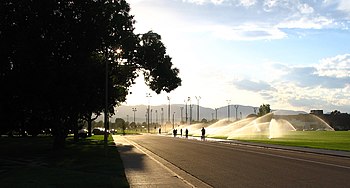
My fellow students,
The State of the Union serves as a marking point, an evaluation of the country, where America has been and where it may go. With a spirit of reflection, perhaps we too, as students of Colorado State, can reflect on ourselves and the institution we are all a part of.
One particular topic to assess, one that affects each and every student at this university, is classes and curriculum, in particular the classes that make up the AUCC curriculum.
Let’s take a look at this general education, which makes up about 25 percent of graduation requirements at CSU. Why does everyone have to take these classes? Who decides what is required and what is not? What has the university been effective at, and what can the university improve in regards to general education?
The general class requirements at CSU are divided into categories. The first two categories are Basic Competencies and Advanced Writing.
Three credits of math, included in the basic competencies, seems to many a painful and useless task. While most people will never utilize their proficiency in logarithms in the workplace, math can provide a mental workout, teaching the ability to take a concept and apply it in an abstract sense.
Writing, on the other hand, is a skill that we utilize more than we think. Writing comes after learning to read, and the two are inexplicably linked. Part of the education that comes with a four year university is developing the ability to communicate with your peers, co-workers, and society at large, and writing is a large part of that education.
The largest category in terms of credits, Foundations and Perspectives, is divided into five subsections, Bio/Physical Sciences, Arts/Humanities, Social/Behavioral Sciences, Historical Perspectives, and Global and Cultural Awareness. Each category intends to contribute to creating well-rounded, educated students.
But how well does CSU’s core-curriculum accomplish that goal? That question is a tough one. How do you evaluate how educated someone is?
Grades have some correlation, but are by no means absolute in determining how much a student has learned.
Postgraduation success, fiscal or otherwise, provides some insight, but alone paints an incomplete picture, due to the various non-educational factors that go into employment opportunities.
Beyond a well rounded education, general education courses also serve to provide new students with a look at various disciplines. Most freshmen are justifiably unsure of which field they wish to focus on. Taking a broad range of courses causes students to engage in perspectives that may have otherwise been swept under the rug.
In addition to perspective, the required courses are supposed to teach beyond their content.
Matt VanderMeulen, adviser for the Liberal Arts College, said, “It is not the practical knowledge, it is the analytical concepts and perspectives [in AUCC courses] that serve to educate.”
Can CSU improve its general education? Yes. I recently finished a public speaking course, and not one famous speech was shown. No MLK, FDR, or JFK.
If the goal of an introductory class is in part to show students the value of that field, is it not an egregious oversight to not show at least one example of the best that field has to offer?
However, CSU also does some things well. My freshman year, I took Logic and Critical Thinking, a course which gave me a skillset in reasoning that I apply to almost everything I do, from writing, to my role as a citizen, or my weekend bouts of Super Smash Bros.
Students are given options, required to learn the basics like math and writing skills, while they search for an individual path to follow. I have finished my core-curriculum courses here at CSU and it is hard to argue that our University is an effective educator on a broad level.
The way I see it, the University has improved and is improving every day. We as students are given chances to better ourselves too, with an incomprehensibly large library, the TILT center, a huge variety of courses, professor office hours, and etc.
We need to continue to push ourselves to be better too, whether it be thinking a little harder about the purpose of a class, or just working a little harder to be better tomorrow than we were today.
VanderMeulen said it best, “The University is responsible for offering opportunities. In the end, the student decides how far they want to take it.”
Collegian Editor at Large Zack Burley can be reached at community@collegian.com





